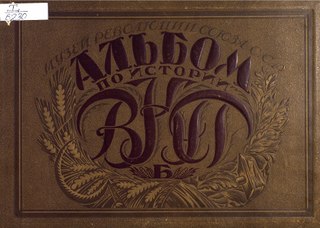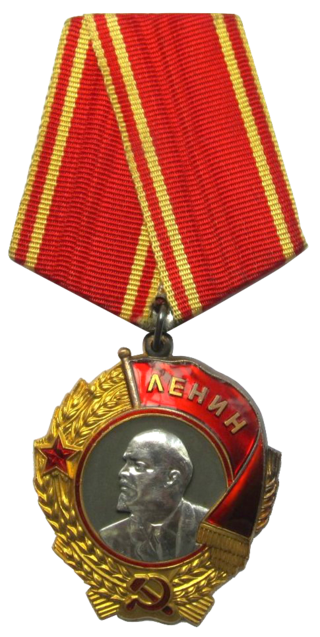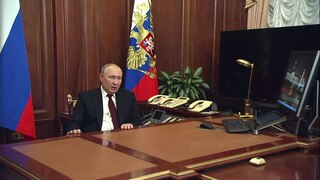Bolshevism is a revolutionary socialist current of Soviet Leninist and later Marxist–Leninist political thought and political regime associated with the formation of a rigidly centralized, cohesive and disciplined party of social revolution, focused on overthrowing the existing capitalist state system, seizing power and establishing the "dictatorship of the proletariat".

An index of articles related to the former nation known as the Soviet Union. It covers the Soviet revolutionary period until the dissolution of the Soviet Union. This list includes topics, events, persons and other items of national significance within the Soviet Union. It does not include places within the Soviet Union, unless the place is associated with an event of national significance. This index also does not contain items related to Soviet Military History.
There were a succession of Soviet secret police agencies over time. The first secret police after the October Revolution, created by Vladimir Lenin's decree on December 20, 1917, was called "Cheka" (ЧК). Officers were referred to as "chekists", a name that is still informally applied to people under the Federal Security Service of Russia, the KGB's successor in Russia after the dissolution of the Soviet Union.

Anti-Sovietism or anti-Soviet sentiment refers to persons and activities that were actually or allegedly aimed against the Soviet Union or government power within the Soviet Union.
Leninsky Avenue or Lenin Avenue was a common name for major avenues in many cities of the former Soviet Union commemorating Vladimir Lenin. As of 2020 there were about 20 Leninsky Avenues and over 100 Lenin Avenues in Russia.
Toponyms Leninsky (masculine), Leninskaya (feminine), or Leninskoye (neuter), named after Vladimir Lenin, may refer to:
Great Russian chauvinism is a term defined by the early Soviet government officials, most notably Vladimir Lenin, to describe an ideology of the "dominant exploiting classes of the nation, holding a dominant (sovereign) position in the state, declaring their nation as the "superior nation". Lenin promoted an idea for the Bolshevik party to defend the right of oppressed nations within the former Russian Empire to self-determination and equality as well as the language-rights movement of the newly-formed republics.
The first significant attempt to implement communism on a large scale occurred in Russia following the February Revolution of 1917, which resulted in the abdication of Tsar Nicholas II. The Bolshevik Party, led by Vladimir Lenin, capitalized on the discontent with the Provisional Government and successfully seized power in the October Revolution of the same year. Lenin's government began to transform Russian society through policies such as land redistribution, nationalization of industry, and withdrawal from World War I. After Lenin's death in 1924, Joseph Stalin's rise to power brought about rapid industrialization, forced collectivization, and widespread political repression, which solidified the Soviet Union's status as a major world power but at a tremendous human cost.

The All-Russian Congress of Soviets evolved from 1917 to become the supreme governing body of the Russian Soviet Federative Socialist Republic from 1918 until 1936, effectively. The 1918 Constitution of the Russian SFSR mandated that Congress shall convene at least twice a year, with the duties of defining the principles of the Soviet Constitution and ratifying peace treaties. The October Revolution ousted the provisional government of 1917, making the Congress of Soviets the sole, and supreme governing body. This Congress was not the same as the Congress of Soviets of the Soviet Union which governed the whole Soviet Union after its creation in 1922.

The history of Soviet Russia and the Soviet Union (USSR) reflects a period of change for both Russia and the world. Though the terms "Soviet Russia" and "Soviet Union" often are synonymous in everyday speech, when referring to the foundations of the Soviet Union, "Soviet Russia" often specifically refers to brief period between the October Revolution of 1917 and the creation of the Soviet Union in 1922.

Alexei Ivanovich Rykov was a Russian Bolshevik revolutionary and a Soviet politician and statesman, most prominent as premier of Russia and the Soviet Union from 1924 to 1929 and 1924 to 1930 respectively. He was one of the accused in Joseph Stalin's show trials during the Great Purge.

The Premier of the Soviet Union was the head of government of the Union of Soviet Socialist Republics (USSR). From 1923 to 1946, the name of the office was Chairman of the Council of People's Commissars, and from 1946 to 1991 its name was Chairman of the Council of Ministers. During the dissolution of the Soviet Union in 1991, its name was briefly Prime Minister and Chairman of the Committee on the Operational Management of the Soviet Economy. The first Soviet premier was the country's founder and first leader, Vladimir Lenin. After 1924, when General Secretary of the Communist Party Joseph Stalin rose to power, the de facto leader was the party's General Secretary, with Stalin and his successor Nikita Khrushchev also serving as premier. Twelve individuals held the post.
Socialism in one country is a theory developed by Joseph Stalin to strengthen socialism within the country rather than socialism globally. Given the defeats of the 1917–1923 European communist revolutions, Stalin encouraged the theory of the possibility of constructing socialism in the Soviet Union. The theory was eventually adopted as Soviet state policy.

The Old Bolsheviks, also called the Old Bolshevik Guard or Old Party Guard, were members of the Bolshevik faction of the Russian Social Democratic Labour Party prior to the Russian Revolution of 1917. Many Old Bolsheviks became leading politicians and bureaucrats in the Soviet Union and the ruling Communist Party. While some died over the years from natural causes, many were removed from power, imprisoned in gulags or executed in the late 1930s, as a result of the Great Purge by Joseph Stalin.

The Order of Lenin was an award named after Vladimir Lenin, the leader of the October Revolution. It was established by the Central Executive Committee on 6 April 1930. The order was the highest civilian decoration bestowed by the Soviet Union. The order was awarded to:

An index of articles related to the Russian Revolution and the Russian Civil War period (1905–1922). It covers articles on topics, events, and persons related to the revolutionary era, from the 1905 Russian Revolution until the end of the Russian Civil War. The See also section includes other lists related to Revolutionary Russia and the Soviet Union, including an index of articles about the Soviet Union (1922–1991) which is the next article in this series, and Bibliography of the Russian Revolution and Civil War.
The bibliography of Russian history consists of the following sections:
There is such a party! is a catch phrase allegedly uttered by Vladimir Lenin on June 17, 1917 at the First All–Russian Congress of Soviets in response to the thesis of the Minister of the Provisional Government Irakli Tsereteli.

"Address concerning the events in Ukraine" was a televised address by Russian President Vladimir Putin on 21 February 2022, announcing that the Russian government would recognise the Ukrainian separatist regions of the Donetsk People's Republic and the Luhansk People's Republic as independent. During the speech, Putin also made a number of claims regarding Ukrainian history and Ukrainian domestic politics. The speech, which marked a significant escalation in the culminating Russo-Ukrainian crisis, was followed three days later by another speech declaring "a special military operation" in Ukraine—announcing the Russian invasion of Ukraine.








